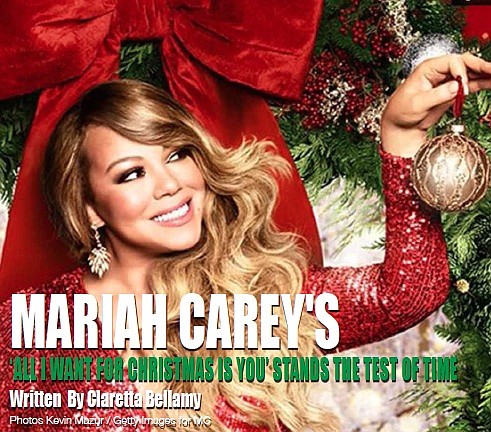new ready for binging with just one click. It just came out in 2020, but Jingle Jangle has quickly cemented itself as a must-watch holiday film. The original new musical broke new ground for the mediu
Style Magazine Newswire | 12/24/2021, 4 a.m.
By Claretta Bellamy, NBCNews.com
Each year, the exuberant feelings and festivities associated with the holiday season are embodied through Mariah Carey’s chart-topping hit “All I Want for Christmas Is You.”
Released in 1994, the popular tune sustains its commercial success almost three decades later. The single recently hit 1 billion streams on Spotify and is the most-streamed Christmas song in the platform’s history. As of Monday, the song had the No. 1 spot on the global Billboard 200 chart again.
Written by Carey herself, “All I Want for Christmas Is You” is both nostalgic for its mid-’90s sound and harnesses a timeless message of hope and joy that comes with the season. According to NBC News’ analysis of the song’s popularity between 2005 and 2021, the song has only become more popular, maintaining above-average listenership in December. In fact, 27 years after its debut on her album “Merry Christmas,” the single “All I Want for Christmas Is You” has graduated from a platinum hit to the even rarer diamond status, and it is the only holiday hit in that category.
The meaning behind Carey’s song relates to her personal desires. Carey described difficult, sometimes tumultuous holidays in her 2020 memoir “The Meaning of Mariah Carey.” Verbal altercations would take place among her family, resulting in Carey experiencing emotional anguish in which she wished for a safe and happy place, she wrote.
In a November interview with Hot 97’s Nessa Diab, Carey explained how Christmas became a hopeful symbol starting in her youth that continued into adulthood.
“At a certain point when I was able to control what my holidays would look like and be like, I started to just put it together and be like, ‘This has to be perfect,’”Carey said. “The amount of pressure I put on myself is huge, but I’ve learned to kind of balance it. So with ‘All I Want for Christmas Is You,’ it’s the same type of thing. I just wrote it from a place of, ‘What would my little girl self write for this song?’”
Beyond Carey’s hit single, many Christmas songs gained popularity through the unique R&B style of Black artists. Each year, WHUR-FM, an urban adult contemporary radio station at Howard University, plays soulful Christmas songs, such as “This Christmas” by Donny Hathaway and “Let It Snow” by Boyz II Men. But Al Payne, WHUR-FM’s programming director, said Carey’s song and singles like it evoke emotion in listeners while forging nostalgia, touching all races and genres. It’s part of why her song remains the biggest Christmas song of all time.
“These songs are bigger than any specific format,” Payne said. “This reminds us of going to grandma’s house on Christmas afternoon. This reminds us of, you know, Christmas morning — unwrapping presents.”
These positive moments relived through R&B Christmas music represents the influence of the experiences of Black artists, who have been integral to American music, across all genres, since its inception.
Jason King, chair of the Clive Davis Institute of Recorded Music at New York University, said Carey’s “All I Want for Christmas Is You” creates a soulful feeling that is associated with Blackness and the Black convivial experience.
“She’s risen to the top in creating a Christmas song that has broken sales records like no other,” King said, “and I think that is also a testament to the power of the Black female voice, to be able to deliver this Christmas message in a way that is deeply powerful and exalts.”
The influence from Black artistry and sensibilities, King said, exists throughout every aspect of popular culture, including theater, film and the foundational elements of popular music — which will remain.
“I think Black music remains the core components of American popular music and influences and underwrites every other genre and style of music in a way that is enduring,” he said, “and so I think Black musicians remain important because Black music is at the root of the American popular musical experience.”





